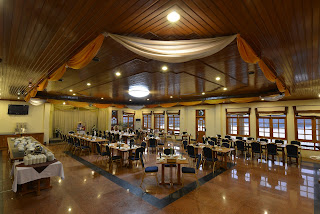English for Hotel and Catering Industry (Unit 4 Taking Restaurant Bookings)
- Posted by zar ni (My Way!) on October 29, 2012 at 8:45
- Unit 3 တုန္းက အခန္းႀကိဳတင္မွာၾကားမႈ ကိုလက္ခံျခင္း မွာ Do/Does နဲ႔ Yes/No ေမးခြန္းေမးပံုကို သိထားၿပီဆိုရင္ ေမးခြန္းေတြ အေတာ္မ်ားမ်ား ေမးဖို႔ေျဖဖို႔အခက္အခဲရွိမွာမဟုတ္ေတာ့ပါဘူး။ ဘာသာစကားရဲ႕လုပ္ငန္း ေဆာင္တာမွာ ေမးခြန္းေမးျခင္း၊ ေျဖျခင္းကအေတာ္ႀကီးေနရာ ယူထားပါတယ္။ ဒီသင္ခန္းစာမွာေတာ့ စာေသာက္ဆိုင္မွာ ေနရာႀကိဳတင္မွာၾကားမႈကို လက္ခံျခင္းကိုေလ့လာသြားပါမယ္။
Unit 4 Taking Restaurant Bookings
Customer:
Good morning. I’d like to make a reservation, please. What days do
you open?
Staff
: We open from Tuesday to Sunday.
Customer : When do you
close?
Staff
: We close on Mondays.
Customer : I see,
and what time do you serve dinner?
Staff
: We serve dinner from 7 o’clock to 11 pm.
Customer : And
what time do you serve lunch?
Staff
: We serve lunch from 12 o’clock to 3 o’clock.
Customer : Umm…
good. Well .. I’d like to book a table for six people at 8 o’clock
on Saturday the 24th of September, please.
Staff
: Umm… we are always busy on Saturdays. We
sometimes have cancellations. But I’m afraid we’re fully book on Saturday,
the 24th. Oh, but I have a table on the 23rd.
Customer:
Hum… OK, Friday the 23rd is fine. Thank you very much.
Staff
: So, that’s a table for six, at 8 o’clock on
Friday, the 23rd of September.
Customer:
Yes.
Staff
: What name is it please?
Customer : Kruger.
K-R-U-G-E-R.
Staff
: OK, we look forward to seeing you on Friday,
the 23rd of September.
ေလ့လာထားရမည့္ expression မ်ား
- I’d like to make a reservation, please. ေနရာႀကိဳမွာထားခ်င္လို႔ပါ။
- What days do you open? ဘယ္ေန႔ေတြဆိုင္ဖြင့္ပါသလဲ။
- We open from Tuesday to Sunday. အဂၤါေန႔ကေန တနဂၤေႏြေန႔အထိဖြင့္ပါတယ္။
- What time do you serve dinner? ဘယ္အခ်ိန္ ညစာအတြက္ ၀န္ေဆာင္မႈေပးပါသလဲ။ (ဘယ္အခိ်န္ညစာစားလို႔ရလဲ။)
- We sometimes have cancellations. တစ္ခါတစ္ေလ မွာထားတဲ့စားပြဲေတြ အစီအစဥ္ဖ်က္တာမ်ိဳး ရွိတတ္ပါတယ္။
- I have a table on the 23rd. ၂၃ ရက္ေန႔မွာေတာ့ စားပြဲတစ္၀ိုင္းအားပါတယ္။
- Friday the 23rd is fine. ၂၃ ေသာၾကာေန႔ ဆိုလဲရပါတယ္။
- We look forward to seeing you. လူႀကီးမင္းနဲ႔ေတြ႕ရဖို႔ေစာင့္ေမွ်ာ္လ်က္ပါ။
ဒီေနရာမွာစာသင္သားေတြမွားတတ္တာက look
forward to ေနာက္မွာ verb infinitive နဲ႔ေရးမိတာပါပဲ။ I look forward to meet you
လို႔မွားေရးမိၾကပါတယ္။ ဒါဟာဘာေၾကာင့္လဲဆိုေတာ့ ငယ္စဥ္တုန္းက grammar အခ်ိန္ေတြမွာ
to ေနာက္က V1 လိုက္တယ္ဆိုၿပီး ဆရာကေရွ႕ကတိုင္၊ တပည့္ေတြက ေနာက္က
သံၿပိဳင္လိုက္ဆုိၿပီး ပံုေသမွတ္ခဲ့ရာကေနျဖစ္တာပါ။ တကယ္ေတာ့ ဒီ phrase မွာ to ဟာ
infinitive marker မဟုတ္ပဲ preposition သာျဖစ္တဲ့အတြက္ေၾကာင့္ သူ႔ေနာက္မွာ noun
သို႔မဟုတ္ gerund (ing form) ပဲလိုက္ရပါမယ္။
I look forward to our meeting.
(Noun)
I look forward to meeting
you. (Gerund)
တျခားဒီလိုမ်ိဳးသံုးေလ့ရွိတဲ့အသံုးေတြကေတာ့
Be/get used to က်င့္သားရသြားသည္။
Get round to အခက္အခဲတစ္စံုတစ္ရာရွိတဲ့ၾကားထဲက တစ္ခုခုကိုလုပ္သည္။/မျဖစ္မေန
အားစိုက္လုပ္ကိုင္သည္။
Object to ျငင္းဆိုသည္။ ဆန္႔က်င္ကန္႔ကြက္သည္။
- He couldn't get used to driving on the other side of the road.
- He couldn't get used to the new traffic rules.
- I'm not used to getting up so early.
- I'm not used to early starts.
- I'll get round to doing it.
- I'll get round to it.
- He finally got around to painting the windows. (North American English)
- I object to working overtime with no extra pay.
- I object to unpaid overtime work.
ေလ့လာထားရမည့္ေ၀ါဟာရမ်ား
a.m. (morning) = မနက္ခင္းအခ်ိန္
p.m. (afternoon/evening) =
ေန႔လည္ခင္း၊ ညေနအခ်ိန္
customer = စားသံုးသူ၊ ေဖာက္သည္
fully booked =
ႀကိဳတင္မွာၾကားမႈျပည့္သြားၿပီ။
(ဟိုတယ္အခန္းျပည့္ေနၿပီ။/စားေသာက္ဆိုစားပြဲ၀ိုင္းျပည့္ေနၿပီ)
open = ဆိုင္ဖြင့္သည္။
ေလ့လာထားရမည့္၀ါက်တည္ေဆာက္ပံုမ်ား
ေန႔စြဲမ်ားေျပာဆိုရာမွာ ၁၅ ေအာက္တိုဘာ ကိုအျပည့္အစံုေျပာမယ္ဆိုရင္
(the fifteenth of October or October the fifteenth) လို႔ပံုစံႏွစ္မ်ိဳးနဲ႔ေျပာႏိုင္ပါတယ္။ ေန႔ရယ္၊ ရက္ရယ္ လရယ္ဆိုရင္ေတာ့ Monday, 1 January (Monday, the first of January or Monday, January the first) on 2 February (on the second of February or on February the second) လိုပံုစံမ်ိဳးနဲ႔ေရးႏိုင္ေျပာႏိုင္ပါတယ္။ သာမန္စကားေျပာရာမွာ အတိုေကာက္ေျပာႏိုင္ေပမယ့္ အမွားမခံႏိုင္တဲ့ reservation လုပ္တာမ်ိဳးမွာ ေန႔ရက္အတိအက်မလြဲေအာင္ အျပည့္အစံုသံုးသြားတာကို သတိျပဳမိမွာပါ။
အခိ်န္ေမးတဲ့အခါမွာ
What time does/do + Subject + Verb + the rest of the sentence ? နဲ႔
When does/do + Subject + Verb + the
rest of the sentence ? ႏွစ္မ်ိဳးေမးႏိုင္ပါတယ္။ What time ကေတာ့
အခ်ိန္နာရီအတိအက်ျဖစ္ၿပီး when ကေတာ့ အခ်ိန္နာရီ ကိုေရာ
ေန႔နဲ႔ပိုေယဘုယ်က်တဲ့အခ်ိန္ကိုပါေမးႏုိင္ပါတယ္။
ေလ့က်င့္ခန္း
၁။ ေအာက္ပါ၀ါက်မ်ားကို မွန္ကန္တဲ့ရက္စြဲသံုးၿပီးျဖည့္ပါ။
နမူနာ (5/8) The restaurant is closed on 5th August.
1. (23/5) We'd like to book a table for two on ... .
2. (7/11) The new bar opens on ... .
3. (24/12) Does the restaurant open
on . . .?
4. (15/2) My holiday begins on . .
.?
5. (30/8) The train leaves at 9.15
a.m. on . . .
6. (27/5) Could I reserve a double
room on . . .?
ေလ့က်င့္ခန္း
၁။ ေအာက္ပါမွတ္စုတို႔ကို ေမးခြန္းႏွင့္အေျဖမ်ားျပန္ေရးၾကည့္ပါ။
နမူနာ what/the restaurant serve dinner (7.00-10.30)
What time does the restaurant serve
dinner?
From 7.00 to 10.30.
1. when/ the restaurant open for lunch.(12.15-3.00)
2. what / my flight leave (18.20)
3. when/ the group arrive from
Russia(6.45 p.m.)
4. what/ the exchange bureau open
(8.00 a.m.)
5. when/ the fitness centre close
(10.30 p.m.)
6. what/ the train leave. (14.50)
ဇာနည္(MyWay!)
Unit(3)
https://htooaungwintt.blogspot.com/2015/11/english-for-hotel-and-catering-industry_11.html
Unit(5)
https://htooaungwintt.blogspot.com/2015/11/english-for-hotel-and-catering-industry_13.html



Comments
Post a Comment